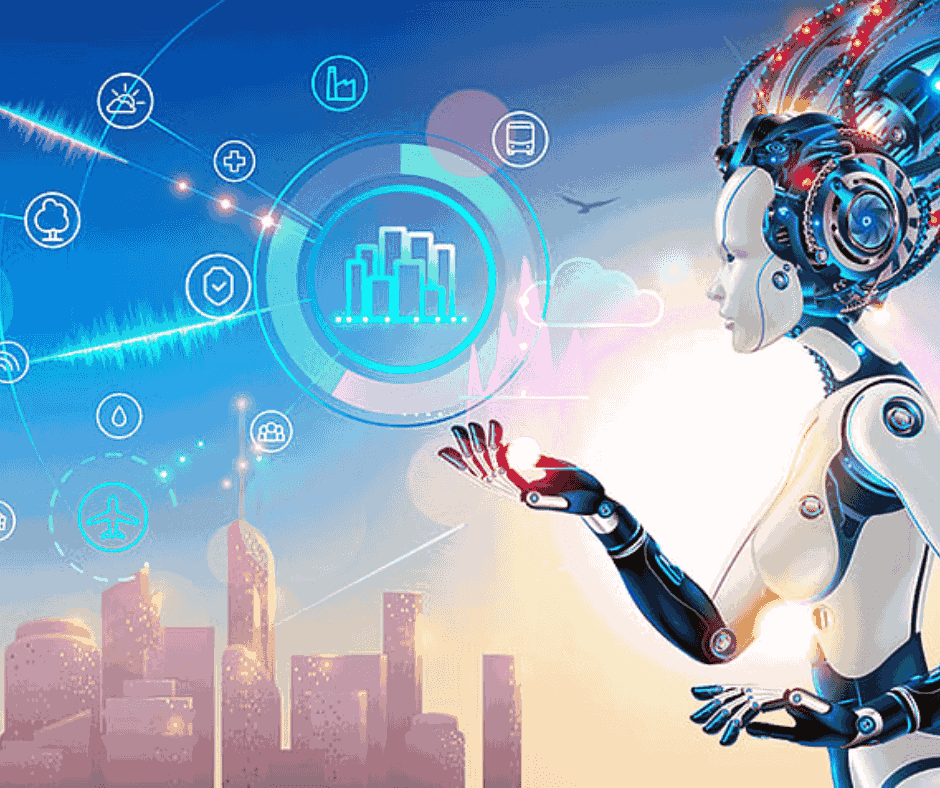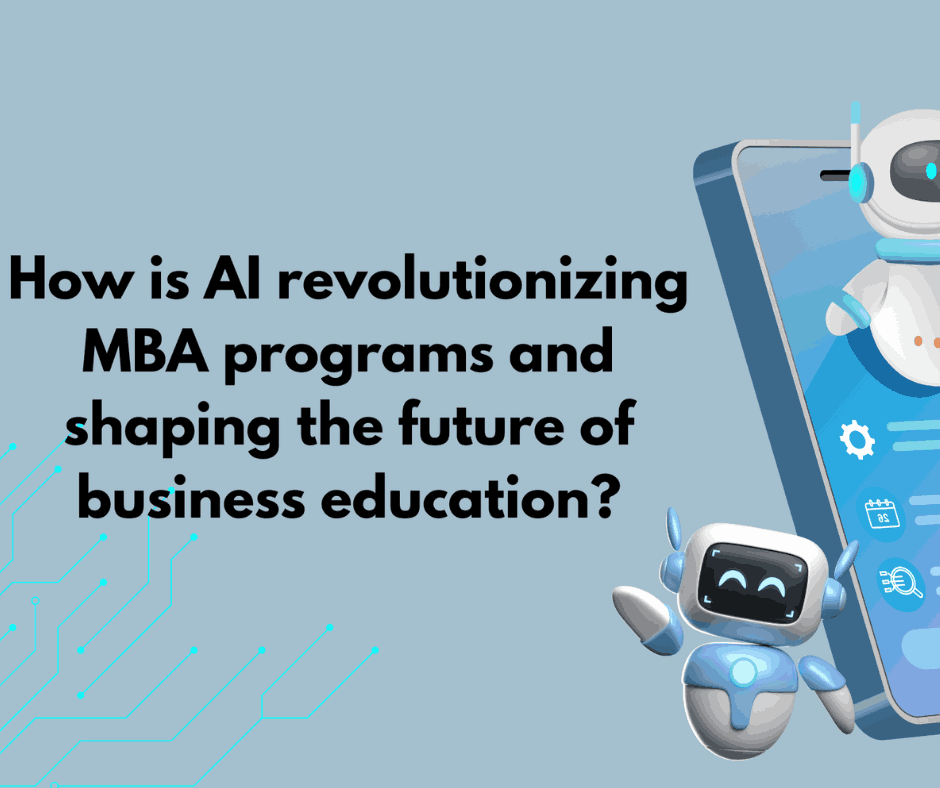As the wave of AI and automation careers sweeps across industries, the job market, especially in business and management roles, is undergoing a seismic shift. For BBA and MBA students at SMS Varanasi, understanding these changes and preparing accordingly is not just beneficial—it’s essential.
This blog post aims to explore how you can mould a successful career in the AI era, focusing on automation-proof jobs for MBA graduates and the skills for future business careers.
The Impact of AI and Automation on Business Roles

The landscape of the job market in the career in the AI era is evolving at an unprecedented pace. Emerging technologies such as artificial intelligence (AI), machine learning, and robotic process automation are not only automating routine tasks but also transforming complex business processes.
For instance, AI-driven analytics are now performing market analysis and customer segmentation – tasks traditionally performed by business analysts.
This shift has significant implications for MBA graduates. While some roles may diminish in demand, AI and automation careers open up new avenues in fields like data science, AI strategy, and process automation consultancy. Understanding these dynamics is crucial for navigating a career in a landscape where technology leads.
Essential Skills for Future Business Careers

When it comes to making a career in the AI era, certain skills become invaluable, particularly for those aiming for automation-proof jobs for MBA graduates. Here are three critical skills to cultivate:
- Critical Thinking: In an environment where AI handles routine analytics, the ability to interpret data output, challenge results, and make strategic decisions based on complex data becomes a prized skill. This level of critical thinking involves not just understanding the ‘what’ but deeply exploring the ‘why’.
- Creativity: As AI takes over more procedural tasks, creativity becomes essential. Creative problem-solving and the ability to innovate new solutions to business problems are skills that machines cannot replicate easily. Creativity also means finding new ways to leverage AI technology to create value.
- Adaptability: The landscape of AI and automation careers is dynamic. Adaptability, being open to learning and evolving alongside new technologies, is vital. For MBA graduates, staying adaptable means continuously updating their skill sets in line with emerging tools and technologies.
Strategies for Staying Competitive in AI and Automation Careers

Here are some strategic approaches to ensure you remain competitive in a rapidly evolving workplace:
- Continuous Learning: The field of AI and technology is ever-evolving. Engaging in continuous professional development and staying abreast of the latest technological advancements is crucial. Online courses, workshops, and certifications in AI, data analytics, and blockchain are beneficial.
- Networking and Collaboration: Building a robust professional network and collaborating across disciplines can open up new opportunities. Participate in tech forums, attend industry conferences, and connect with professionals in the AI and automation sectors online (using platforms like LinkedIn) and offline.
- Specialisation: While a broad MBA education provides a solid foundation, specialisation in areas directly impacted by AI and automation, such as digital marketing, fintech, or supply chain analytics, can set you apart. Specialised knowledge in these areas aligns with the trajectory of future business needs.
- Ethical and Human-Centric Approach: As businesses deploy AI solutions, the need for professionals who can navigate the ethical dimensions of technology increases. Understanding the implications of AI on privacy, employment, and fairness and advocating for responsible AI use are important aspects of future leadership roles.
- Embrace Entrepreneurial Thinking: This era offers unprecedented opportunities for entrepreneurial ventures. Innovations in AI and automation provide a fertile ground for new business ideas. MBA graduates should consider harnessing their knowledge to pioneer startups or new business models within existing companies.
What are some automation-proof jobs for MBA graduates?

AI and automation are increasingly taking on more roles and responsibilities in the workplace, leading to significant changes in the job landscape. However, certain business careers still require a level of human insight, creativity, ethical judgment, and interpersonal skills that AI cannot replicate.
Here are some business careers that AI and automation are unlikely to take over:
- Strategic Decision-Making: While AI can provide data-driven insights and recommendations, the final strategic decisions often require human judgment that considers ethical, cultural, and long-term business implications beyond mere data analysis.
- Human Resources and Talent Management: Human resources involves understanding human emotions, motivations, and subtleties in interpersonal dynamics that are beyond the capabilities of AI. Building team culture, resolving conflicts, and managing employee relationships require a personal touch.
- Negotiation and Persuasion: High-level negotiation involves understanding psychological dynamics, cultural nuances, and strategic give-and-take, which are areas where AI lacks proficiency. Careers involving complex negotiation, such as high-stakes sales roles or corporate deal-making, rely heavily on human intuition and experience.
- Innovation and Entrepreneurship: The process of creating new business models, products, or services often involves out-of-the-box thinking and risk-taking, which are inherently human traits. While AI can support innovation by providing information and patterns, the creative spark and the courage to pursue new ideas come from humans.
- Client Relationships and Business Development: Building long-term client relationships involves trust, empathy, and understanding client needs on a deeper level. AI can assist with data management and initial communication, but the personal connections that drive business development are uniquely human.
- Ethics Officer: As companies navigate the complex terrain of modern ethics in technology and business practices, the role of an ethics officer becomes crucial. These professionals ensure that a company’s operations uphold societal values and ethical standards, a responsibility poorly suited to AI due to its lack of moral consciousness.
- Change Management: Leading an organization through change requires understanding cultural subtleties, managing emotions, and inspiring people to embrace new ways of working. These are deeply human capabilities that AI cannot replicate.
- Crisis Management: Managing a crisis involves quick thinking, calm decision-making under pressure, and human empathy to understand the impacts on all stakeholders. These aspects of leadership and management are beyond the emotional grasp of AI.
AI and automation will undoubtedly reshape many aspects of business careers but the roles that require human emotion, ethical judgment, personal interaction, and high-level decision-making are likely to remain in the hands of skilled professionals. As we move further into the future, blending AI capabilities with these uniquely human skills will be key to career success and advancement.
Conclusion
The transition into a career in the AI era is not without its challenges, but it also offers abundant opportunities for those prepared to adapt and innovate. For MBA and BBA students at SMS Varanasi, focusing on developing future-proof skills and embracing the changes brought about by AI and automation can lead to rewarding and secure career paths.
Automation-proof jobs for MBA graduates exist, but they require a proactive approach to skills development and a strategic view of the future marketplace.
Embracing AI and automation careers does not just involve technical knowledge but a holistic approach to how technology transforms business practices and customer interactions. Prepare now, and you will navigate the future with confidence and success.





